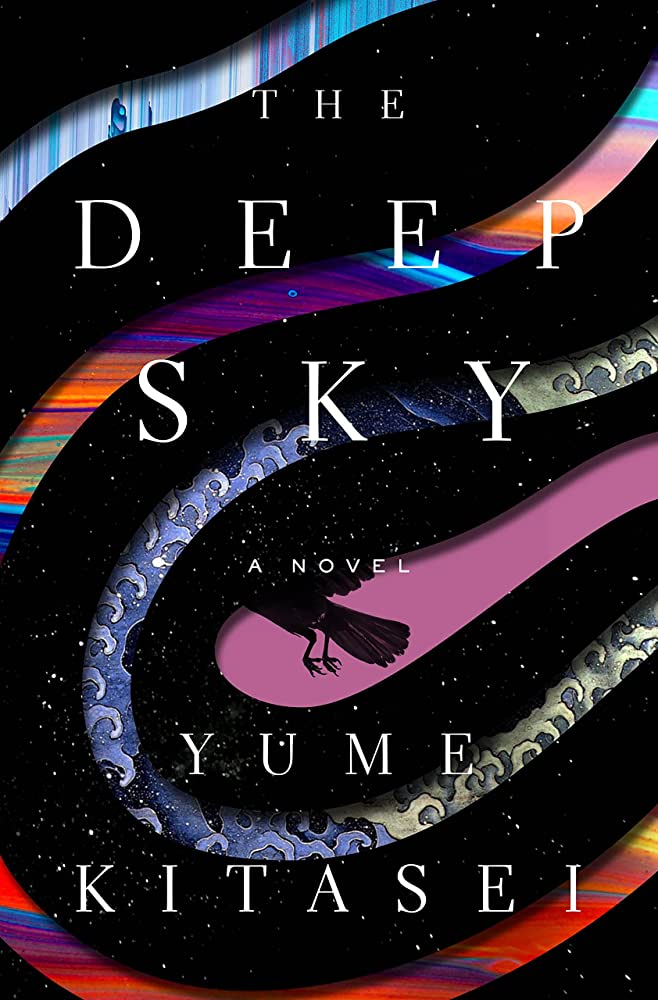There were some pandemic novels about the pandemic itself, produced with a startling alacrity and provided by an industry eager to contend with the trauma if only so it could get back to business as normal. And so we got The Sentence by Louise Erdrich, Joan is Okay by Weike Wang, Companion Piece by Ali Smith. I like all these authors—and I couldn’t get through any of these books. The only two pandemic novels I did manage to finish—after my vaccine, my booster, and the de facto end to lockdown, I should add—were Delphi by Clare Pollard and The Reservoir by David Duchovny, and I only managed them because they were (a) short and (b) weird. The pandemic was like the sun. It bore down on everything, and I didn’t dare look at it directly. I needed the fantastical as cover.

And okay, I review mostly SFF, it’s how I make sense of a lot of my life, but I think this was more particularly and more broadly true for pandemic-related reading. A lot of us did not want to contend with reality. Reality was already contending with us, and we were bloody and bored from the unending battle. We needed to come at the whole crisis from an oblique angle, at a safe distance.
The Deep Sky by Yume Kitasei is a pandemic novel at arms’ length, which makes it far more accessible and interesting to read. It reimagines a lot of the things we all knew far too well, the isolation and the unsatisfying digital escapism and the goddamn birdwatching, even. (I’m a grandmother at heart, but even I never wanted to see that many people so desperate that they become amateur ornithologists.) Which is apt; as T. S. Eliot’s famous bird says: “human kind/ cannot bear very much reality.”
No one in the disastrous near-future of The Deep Sky can bear very much reality, either. Kitasei starts with a neat trick, introducing us to two of protagonist Asuka’s realities simultaneously. We meet her as she navigates the cramped spaceship carrying her and 79 other crew members to another planet, a relentlessly utilitarian space made bearable by VR implants, which give each of the crew an immersive, personalized reality to enjoy. Asuka’s is a forest richly populated by birds that have sadly gone extinct back on Earth, and their digital existence serves as a touchstone of both the hope and the horror of this last-ditch expedition.
Earth is dying. Climate catastrophe has ravaged every part of the world, and the world’s governments, in various shades of incompetent and mistrustful, partner with a seemingly altruistic billionaire to fund a one-way journey to colonize Planet X. To have the best chance of populating this new world, the space program accepts only girls and nonbinary applicants who will be able to bear children, and begins training them from a very young age to become experts in robotics, astrophysics, medicine, and other useful skills. The program plans to ensure it has the best and brightest by whittling down 800 hopefuls to 80 crew, and roughly half the book is dedicated to this brutal competition, as seen in retrospect as Asuka tries to use her hard-won skills to solve a present-day disaster.
The Deep Sky is a rebuke to the Ender’s Game vision of a meritocratic space program, questioning the assumption that any existing system—whether military, capitalistic, or even pluralistic—can truly judge a child’s worth or potential. Asuka is, of course, the ultimate case for this: she has the lowest status as the “alt,” but her jack-of-all-trades approach proves essential to the entire crew’s survival. Her willingness to collaborate, to forgive, and to extend compassion are also essential traits, far more so than the military-esque structures that end up creating as many problems than they solve.

Which isn’t to say that this book is a big preachy kumbaya. It’s more that Kitasei values complexity: she’s created a pressure cooker of competing values, tight deadlines, high stakes, and intense loyalties, and she isn’t about to dole out trite or easy answers. There are no heroes in space, or rather, everyone is a hero in space: without teamwork, no one survives an environment literally inimical to life.
We also discover that many of the health exclusions don’t actually mean that the crew is mentally well. There are horrifying fascist elements who might be attempting a covert eugenics program—not sane by any measure—and many members of the crew are debilitated by PTSD or trauma sustained because of the program. To hear that applicants to the space program were initially screened out for having manageable conditions casts a very nuanced and thoughtful light on how we think about “health” vs. resilience.
The Deep Sky is being marketed as regular SF, but this has a very strongly YA vibe, not just because the characters are young, but also because some of the themes are very teenage-focused. Asuka’s journey of confidence would be right at home in the YA section, as would the emotional arcs of several secondary characters. All the characters act a bit young, which is, I want to stress, very realistic both for their ages (early 20s) and for the fact that they’ve spent their entire childhoods pursuing a single goal with relentless focus. They haven’t had the chances to make mistakes, form external relationships, or have other responsibilities. That plays with development in ways that I think Kitasei was very adept at portraying. Still, I would be remiss if I didn’t mention that The Deep Sky skews a bit younger, even though it does engage with complex political topics.
And hoo boy, are those politics relevant. Despite all attempts to keep focused on their education (in the past chapters) or on their mission (in the present), all kinds of geopolitical and ideological groups impose themselves. China and America are continually at odds, and there is a slew of racist, xenophobic, fascist, misogynistic, and plain old conspiracy groups who either want to hurt or sway the competitors. Asuka’s own mother falls prey to a deeply paranoid group that is also nominally pro-environment, but which may have eco-terrorist underpinnings. To have to deal with insane ramblings about microchips and mind control is certainly all too familiar in the American cultural landscape, and it was a strange combination of cathartic and painful to see it portrayed so well.
The whodunit isn’t quite tight enough (one major objection is that confidentiality always has failsafe exceptions), but I think the slew of competing motivations and allegiances are incredibly well developed, leading to a completely believable cast of suspects. I was wrong a couple of times when I thought I knew who did it, and I love that. I also love that the bird facts play a larger role than I’d initially assumed, which makes for a great little gottcha moment.
There’s just so much to love about The Deep Sky, a book both smart and ultimately wise about how we will address our current crises, and whether they can be solved or only deferred. It’s a fast-paced read that invites readers to slow down and really think, an impressive feat for a debut that was clearly rooted in pandemic chaos but so elegantly managed to rise far above the fray.
The Deep Sky will be released July 18, 2023.
